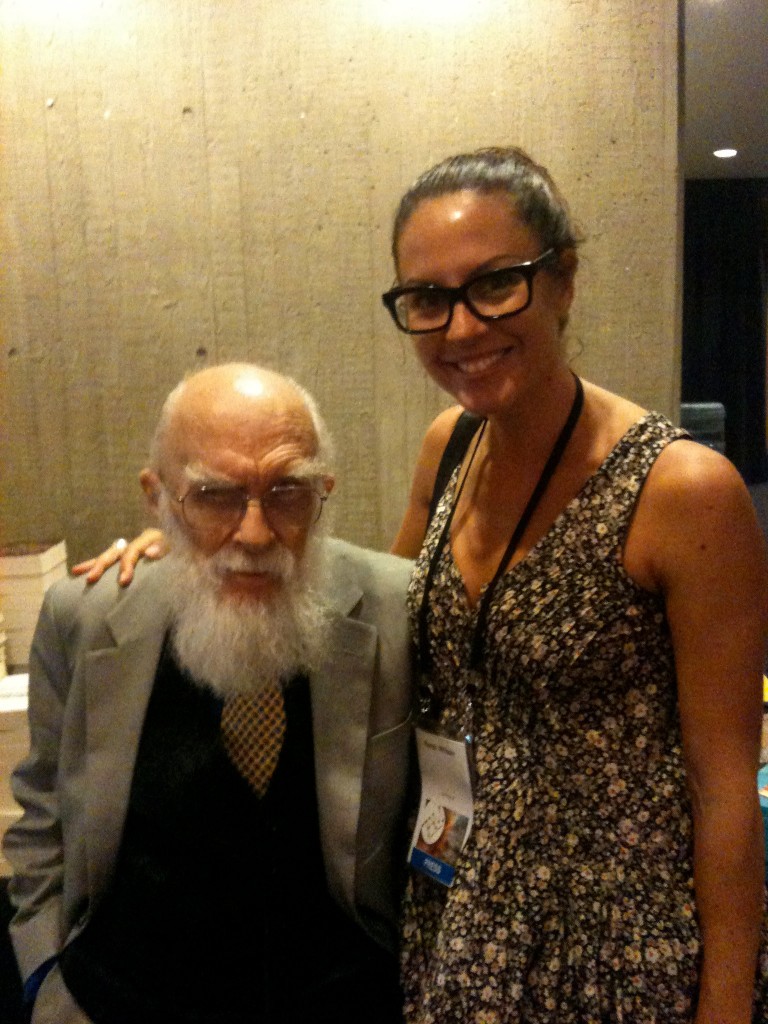This week I’m awesomely skeptical

It’s pretty fun.
I met Canadian James Randi, known in his magician days as The Amazing Randi, on Friday while he was here attending the Australian Skeptics’ annual Amazing Meeting (that’s seriously the name). In a moment of the kind of synchronicity that skeptics frown upon, it was the day after celebrity psychic John Edwards, a target of skeptical thinkers, spoke in the same room. Amazing!
The whole experience was rendered more surreal by the fact Randi looks like he’s stepped from warlock central casting – stooped and coming up to my ribcage he sports a long white beard, wireframe spectacles and a comically cocked eyebrow. And is delightfully enthusiastic.

Randi is regarded as a founder of the formalised skeptics movement and has spent the past two decades debunking paranormal and supernatural claims (he goes after celebrity spoon-bender Uri Gellar like a kid with a plait to pull). Why? He tells me it upsets him deeply to see people fooled and ripped off by quacks. He says he doesn’t disprove: “You can’t prove a negative”. Instead he “explains” and gives answers. Using tricks he demonstrates how psychics pick the name of your cat and how faith healers work their “miracles”.
He got me. During our chat Randi had me pick a word from a book I chose randomly from a bookstall. He then guessed the word (spelling it out upside down for extra paranormal-ish effect). I was stumped as to how he did it. If you’ve ever had an ontological debate with an 82-year-old skeptic/magician, you’d know this delighted him no end, though he wouldn’t tell me how he did it. “Is it not possible you’re actually psychic, but you’re tricking me by saying it’s mere sleight of hand?” I ask. No, he says. Any mentalist would be able to identify the trick he’d just used.
But eventually we dig down into spirituality and the meaning of life. I mean, when you’re debating with someone who doesn’t believe in unprovables like God and universal consciousness (although some argue this has been proven to exist), it kinda begs: why and how are we here? Can our existence be explained? We’re programmed to exist, he says. “A squirrel is designed to collect nuts and grows fur.” But why? To survive and evolve, he says. Which I found to be a very circular argument. And not very satisfying. We circle some more, then Randi says, “There doesn’t have to be a reason or an answer for everything.” I agree, I agree!
I share with Randi I think it’s part of the richness of the human experience to believe things – the existence of souls, energetic connections – that can’t be explained. Since I was a kid I’ve gleaned great joy from contemplating possibilities, and the idea of “life” beyond the confines of the rational needs of the human brain. I’ve been deeply satisfied just knowing or experiencing something without understanding cerebrally why.
It’s called awe and it lends my life richness.
It feels to me too ego-centred to maintain existence can only be that which we perceive with our limited means. Further, a growing number of academic studies show that believing in something bigger than us, in an unexplainable knowing, is a prime cause of happiness and longevity.
I ask Randi what his most memorable moment in life has been. He answers without hesitating. When he was 11 his uncle took him to an observatory in Ontario and he saw Saturn through a telescope. The astronomer told him it was Saturn, but 30 minutes ago, because that’s how long it took the image to reach earth. Randi’s quite emotional as he tells me about the impact such a learning had on him. Would he call it awe? Yes. It spurred him on to investigate life…and shonky charlatans.
Which got me thinking. In the final count, perhaps all of us are simply following our awe. Skeptics don’t profess to have all the answers. Believers aren’t all shonks. And there isn’t always a reason. Amazing!
What makes you stop in awe? Which side of the fence to you land on? Skeptic? Happily mystic? Or having fun exploring both?

